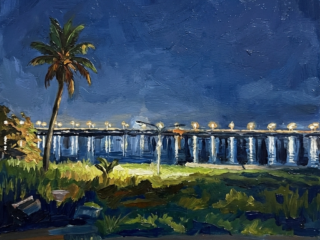The philosopher’s luxury consists in part of play with thought and phenomena. If, they may say, for example, a tree falls in the forest and no one is there to hear it, does it register in reality? And so on, ontologically and metaphysically. Following their road less travelled I ponder if, at the start of the 21st century, in the year 2000 specifically, a booktree was planted in the parklands of African Literature, does it measure on the Richter Scale of literary consciousness? The answer, if the name of the booktree is Arrows of Rain and the hands that planted it Okey Ndibe’s, is an emphatic, unequivocal YES.
“Tell all the truth but tell it slant” counseled Emily Dickinson. And what is more truthful and slant than the rain? Arrows of Rain, Okey Ndibe’s debut novel, originally published by Heinemann in the year 2000 and now reissued by Bookcraft in 2021 is a canonic rendering of our collective consciousness, and, even more importantly, of our collective unconscious. Ndibe has often implied that the book began as an apostrophized uttering of his ambition to write a novel even while he was yet putting the psychic scaffolding in place – in his head. Necessity brought it forth into material form, in a way, and made an honest novelist out of Ndibe in the end.
Set in the fictional country of Madia, Arrows of Rain is a sandwich of national history, star-crossed love and dreams, professional ethics, people and power, exploitation and shame, orature and literature. Stretched as a canvas over decades in the lives of both Madia, that fictive country with keen semblances to Nigeria, and various individuals some of whom wear thin disguises and some of whom are composite characters that we can recognize – pitching sides in an epic battle between silence and truth-telling. There are skirmishes we can identify with. Of civilians and soldiers, whether we live in Eswatini today, Uganda in 1977, Sudan yesterday or Ghana in 1980. There are monstrosities perpetrated in army uniform and wounded memories that still haunt the land which has yet to reach that plane where light is right.
The main narrator is a young journalist, Femi Adero. He is supported by a cast of characters chiming in at various points in the plot that holds up the novel, stating and restating a gravid message – a story that must be told never forgives silence. The story begins on New Year day at B Beach. A woman, a prostitute, had drowned after being sexually violated by a gang. The prime suspect is Bukuru, apparently out of his mind except for the fact that he gives compelling and consistent testimony as to the true circumstance under which the young prostitute drowned when arrested and arraigned in court for the crime of murder.
Arrows of Rain, told with aplomb and a certain gravitas, fulfils a primary function of the novel – breaking the silence. And then it enacts the second function of the novel, it reinvents silence. Literature and speech share the double helix that is the human story. Speech is the older strand in memory’s genome. For a long time, after writing emerged on stones and clay and even papyrus, those who could read did their reading aloud. It is said that in the monasteries, the first instances of reading in silence were considered to be some sort of sorcery. Reading Arrows of Rain, I remembered this apocryphal account in the history of text. We do not know and have no means of knowing what it was that was being read when the reader went silent and yet continued to comprehend but Arrows of Rain is probably the kind of material that gave the man or woman pause.
For me, there were literal moments of recollection, of recognition: police investigations conducted in name only, charades in the name of judicial proceedings, carceral sleights of hand that send the country into spasms, military misadventures that sets society back by decades, the Lekki Toll Gate Massacre. It did not matter whether the victim of murder was a prostitute or the Attorney General of the country – the sequence, the predictable sequence, was the same. There is symbolism aplenty, a semiotic wealth in the telling of Arrows of Rain. Wherever society is subjugated under the whims of individuals who target the press for punishment when the fourth estate of the realm steps out of the arbitrary red lines of despots, the function of preservation of collective memory shifts onto the storyteller more than on the journalist. If the novelist does his or her job well, we have a result very much like what we have in Arrows of Rain.
Arrows of Rain is a study of a kind of social pathology in which power is a key intoxicant. Bukuru, the ostensible madman, with his life on the margins, is a key witness, a veritable source of communal memory. Deemed demented by most of society, he nevertheless retains and transmits, with freshness, those details that society as a whole has suppressed. Coming into contact with the journalist, whose writings society as a whole tends to be more comfortable with, there is a potentiation of memory, an added charge to the communal consciousness which triggers a wave of panic in corridors of power. There is icing on the cake of the narrative chain but for that the reader should purchase this book, or go into the library and read.
There is a continuous tango with, and a continuous examination of power in the narration. There is very little that we see of the inner life of Isa Palat Bello, the arch villain in the novel, a consolidation of arch villainy actually, perhaps because there is none. In contrast there is so much of the inner lives of ordinary people whose humiliation by the powerful touches us so. There is misfortune, ancestral millstones/milestones wrapped around the necks of key actors. How they negotiate these is part of the real charm of this novel. This story begun in a shroud of mist on the shore of the Atlantic has nothing pacific about it.
In Arrows of Rain, Okey Ndibe embarks on a narrative project that reifies the human voice. In the telling of this tale which would never forgive silence we come face to face with what we would rather banish to the fringes for fear. The inner exiles are many if we would but see. They are as many as those who audibly contemplate that new and strange word ‘japa’. In any case, the book asks us in not so many words: we dey alright so?
Pidgin English was never meant to be the forte of this book, I can imagine. The broken English here has been to Amrika and back, it is educated now, and thus has lost some of the raw appeal and musicality of the feral form of that language. But Ndibe presses it to service still, with a stiff upper lip. It must suffice that the reader gets the general idea, which is the essence after all.
Strewn throughout the book are little keys, roman à clef, to help unlock large and little doors into Madia’s dark. For example, the epistolatory stream, never requited, from Iyese to her lover is time-stamped as beginning on June 12. For a reader in Papua New Guinea, this is another day on the calendar but for a Nigerian reader, it’s a date that sets off waves in the psychic echo chamber of something star-crossed, something fated to truncation, promise that expires before its half-life. Stenciled also into the narrative ever so delicately are the outlines of karma. Thunder may break, said Okigbo, the context of rain is wide, sometimes including mega wattage of nature’s wrath.
The mental image conjured by Ndibe’s labour here is of a man holding a heavy bunch of keys. He is not the jailor. On the contrary, he is the emissary of freedom. There is a little patience required to find the precise key for the particular door, the patience is rewarded with a sweet and sour denouement in this literary saga.
Ours is not the typhoon country, particularly. We have what geographers would call line squalls. It is why an author can put arrows and rain together in the title of a tale. There is potential cataclysm in these, as the climate changes, literarily.
The arrows in this tale are assayed elegantly by Ndibe himself but the last word on Anthropocene rain must belong to Aime Cesaire who renders, with luminous lyricism the inexhaustible horizon of liquid realities. Cesaire made rain immortal in his poem by that title from which I pluck these final lines:
“Rain capable of everything except washing away the blood
that flows on the fingers of the murderers of entire peoples
surprised in the soaring forests of innocence.”
This is true forever. And for berserkers as the Isa Palat Bellos of the world, truer.



